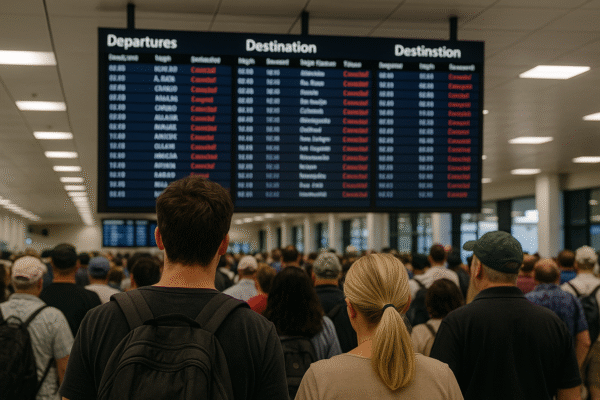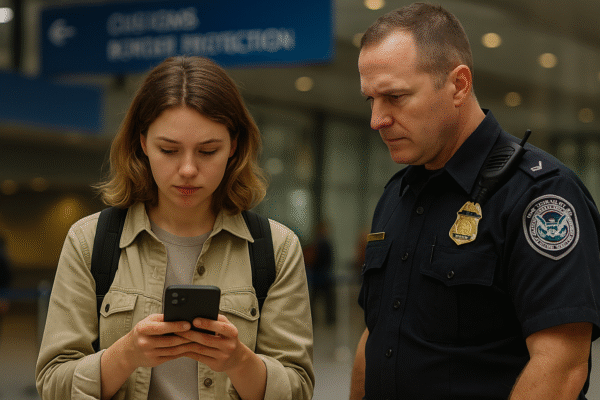South Africans and other international tourists planning a visit to the United States are being urged to carefully manage their social media presence and digital devices before departure. A recent incident involving Norwegian tourist Mads Mikkelsen, who was denied entry into the U.S. due to a political meme on his phone, has sparked global concern about digital privacy at U.S. borders.
The Mikkelsen Case: A New Era of Surveillance
In June 2025, 21-year-old Mads Mikkelsen arrived at Newark Liberty International Airport for a summer holiday. However, upon inspection of his smartphone, U.S. Customs and Border Protection (CBP) officials found a meme satirizing Vice President J.D. Vance. He was denied entry and deported, despite the official reason citing “prior drug use” — an explanation now widely questioned.
Mikkelsen’s story has gone viral and ignited an international conversation about how personal digital content — from jokes to political opinions — can impact a traveler’s eligibility to enter the U.S. The case underscores a growing reality: your online footprint can have real-world consequences at immigration checkpoints.
What U.S. Law Allows at the Border
Under U.S. immigration and customs laws, border officials are permitted to search foreign nationals’ electronic devices without a warrant or probable cause. This differs from the protections U.S. citizens enjoy under the Fourth Amendment.
These “border searches” can include:
- Viewing photos, social media apps, and messages.
- Conducting keyword searches through your content.
- Accessing cloud-based content if it’s automatically synced.
Travelers can legally refuse device searches, but such refusal often results in being turned away at the border or placed in temporary detention. If officials claim “reasonable suspicion,” they can escalate to forensic-level device analysis — a controversial practice criticized by privacy advocates.
According to the Electronic Frontier Foundation (EFF) and American Civil Liberties Union (ACLU), such practices exist in a legal gray area, particularly for non-U.S. citizens who do not enjoy the same constitutional rights.
South African and Global Tourists: What You Must Know
South African passport holders — along with other global travelers — should take extra care before boarding a U.S.-bound flight. Here’s how to prepare:
1. Scrub Your Digital Footprint
Delete political memes, comments, and content that could be interpreted as critical of the U.S. government or politicians. Even content meant as satire could raise red flags.
2. Expect Device Searches
Your smartphone, tablet, or laptop may be subject to search. These inspections are routine and not always based on suspicion.
3. Comply or Face Consequences
Refusal to unlock devices can result in denial of entry or being held for questioning. Tourists can legally be detained for up to 90 days without being formally charged.
4. Legal Protection is Limited
As a tourist, you are not covered by the same legal protections U.S. residents have. Legal remedies are few, and you may not even get the opportunity to contact a lawyer during initial processing.
The Bigger Picture: Tourism at Risk
International concern about U.S. digital surveillance at borders is growing. According to the World Travel & Tourism Council (WTTC), the U.S. could lose over $12.5 billion in tourism revenue this year due to increasingly invasive security practices.
While global travel has rebounded post-pandemic, travelers are now second-guessing trips to the U.S., fearing privacy violations and arbitrary deportation.
This trend could undercut positive tourism boosts driven by soft power — often referred to as the “Taylor Swift Effect.” Major concerts, events, and cultural tourism typically attract millions of international visitors, but rising digital surveillance threatens to curb that momentum.
How to Safeguard Your Privacy Before a U.S. Trip
Here are practical tips for travelers from South Africa and beyond:
- Back Up and Wipe: Back up personal data to the cloud and wipe your devices before travel.
- Use a Clean Travel Phone: Carry a secondary phone with minimal apps and data, solely for travel purposes.
- Avoid Political Posts: In the weeks before your trip, avoid posting or engaging in political discourse related to the U.S.
- Understand the CBP Process: Learn what to expect during entry procedures.
Conclusion: When Digital Privacy Meets National Security
Mads Mikkelsen’s ordeal is a cautionary tale for international travelers. While border security is a sovereign right, the intersection of immigration control and digital surveillance presents a growing challenge to freedom of expression and global mobility.
Whether you’re traveling from Cape Town, Oslo, or Tokyo, digital discretion is becoming as essential as a valid visa. The message is clear: think before you post — your online voice could have offline consequences.
As U.S. entry policies tighten, being proactive about your digital hygiene is no longer optional — it’s the new reality for global tourists.
For more travel news like this, keep reading Global Travel Wire



















